Alejandro Zambra: Tema libre [Free Topic]
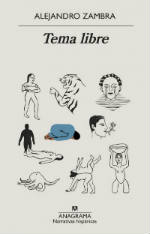 A miscellaneous book on life and literature, a showcase of the writer’s goldsmith’s talent. This collection of fiction, essays and chronicles can be understood as a fervent defense of literary creation, or as a call to disobey the rules of the game, or as the result of an obsessive (and compulsive) reflection about words. Or like all of that at once, or like none of that, because, as its title announces, this extravagant and delicious book points in multiple directions; it resists being one thing. Tema libre [Free Topic] adds an unsuspected chapter to the celebrated work of Alejandro Zambra, who has become a fundamental author of Latin American literature.
A miscellaneous book on life and literature, a showcase of the writer’s goldsmith’s talent. This collection of fiction, essays and chronicles can be understood as a fervent defense of literary creation, or as a call to disobey the rules of the game, or as the result of an obsessive (and compulsive) reflection about words. Or like all of that at once, or like none of that, because, as its title announces, this extravagant and delicious book points in multiple directions; it resists being one thing. Tema libre [Free Topic] adds an unsuspected chapter to the celebrated work of Alejandro Zambra, who has become a fundamental author of Latin American literature.
Ana V. Clavel: Breve tratado del corazón [Brief treatise of the heart]
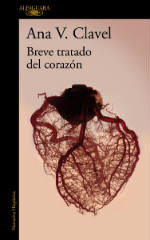 In this novel, one finds intertwined the destinies of a woman who is about to commit suicide that pauses to think that she has not seen the Taj Mahal, a man undergoing heart surgery who leaves the hospital and discovers that he is no longer the automaton that he was, a dismembered young woman who wanders like a soul without direction, and a cannibalistic hitman, owner and lord of the legions that live inside. Narrated through four voices that follow one another like an irrepressible blood flow, the protagonists of this story allow us to glimpse one of the greatest enigmas, literary or not: the human heart, that territory of chiaroscuros, desires and mysteries.
In this novel, one finds intertwined the destinies of a woman who is about to commit suicide that pauses to think that she has not seen the Taj Mahal, a man undergoing heart surgery who leaves the hospital and discovers that he is no longer the automaton that he was, a dismembered young woman who wanders like a soul without direction, and a cannibalistic hitman, owner and lord of the legions that live inside. Narrated through four voices that follow one another like an irrepressible blood flow, the protagonists of this story allow us to glimpse one of the greatest enigmas, literary or not: the human heart, that territory of chiaroscuros, desires and mysteries.
Carolina Rueda: Ciudad y Fantasmagoria. Dimensiones de la mirada en el cine urbano de Latinoamérica del siglo XXI [City and Phantasmagoria. Dimensions of Seeing The Latin America Urban Cinema of the 21st Century]
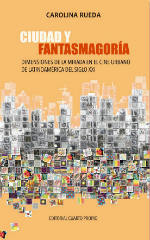 Ricardo Forster describes how Ciudad y Fantasmagoria. Dimensiones de la mirada en el cine urbano de Latinoamérica del siglo XXI “achieves something unusual in contemporary studies: crossing the watertight lines of the disciplines and enabling the critical confluence of the gaze of cinema, philosophy, literature, cultural criticism and politics. Through film and Carolina Rueda’s exemplary performance, Latin America is shown as it is seldom presented to us, allowing, in turn, a certain Benjaminian flânerie to recover scenes of urban areas furrowed by the experiences of bodies subjected to the harshness of powers and fragmented forms of everyday life.”
Ricardo Forster describes how Ciudad y Fantasmagoria. Dimensiones de la mirada en el cine urbano de Latinoamérica del siglo XXI “achieves something unusual in contemporary studies: crossing the watertight lines of the disciplines and enabling the critical confluence of the gaze of cinema, philosophy, literature, cultural criticism and politics. Through film and Carolina Rueda’s exemplary performance, Latin America is shown as it is seldom presented to us, allowing, in turn, a certain Benjaminian flânerie to recover scenes of urban areas furrowed by the experiences of bodies subjected to the harshness of powers and fragmented forms of everyday life.”
Claudia Piñeiro: Quien no [Who doesn’t]
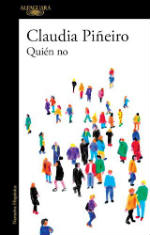 This is Claudia Piñeiro’s shocking new storybook. A set of stories that, as short everyday scenes, address situations in which we can all feel recognized. Some situations are rare and go unnoticed, others are like little obsessions that play out during the daily routine. Here feelings can lead to crime, and they always nest in people’s most secret places. In these accurate, intimate, and brave tales blood runs, sometimes bubbling up, and others as a fine red thread on clothe, to remind us that no one is safe from violence, and that behind our masks of normal people we are all “a little weird”.
This is Claudia Piñeiro’s shocking new storybook. A set of stories that, as short everyday scenes, address situations in which we can all feel recognized. Some situations are rare and go unnoticed, others are like little obsessions that play out during the daily routine. Here feelings can lead to crime, and they always nest in people’s most secret places. In these accurate, intimate, and brave tales blood runs, sometimes bubbling up, and others as a fine red thread on clothe, to remind us that no one is safe from violence, and that behind our masks of normal people we are all “a little weird”.
Cristian Cruz: Dónde iremos esta noche [Where we’re going tonight]
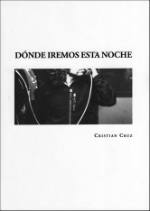 “The poet wanders into his night and seeks in the darkness a way for his life and for his craft, without too much hope; rather, chewing the hard bread of loneliness that has been forged by his own disillusionment and by his own mistakes. In that trance between a disastrous life and writing that seeks to decipher it, the reader can find those luminous sparks in which the beauty of language and the miseries of existence converge. In both, the heart throbs, realizing its resounding humanity.” Luis Rifo
“The poet wanders into his night and seeks in the darkness a way for his life and for his craft, without too much hope; rather, chewing the hard bread of loneliness that has been forged by his own disillusionment and by his own mistakes. In that trance between a disastrous life and writing that seeks to decipher it, the reader can find those luminous sparks in which the beauty of language and the miseries of existence converge. In both, the heart throbs, realizing its resounding humanity.” Luis Rifo
Fernando Aramburu: Vetas profundas [Deep Streaks]
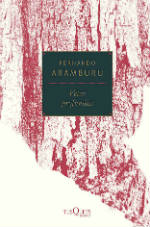 After an unpleasant walk through the busy and crowded street of one of our cities, Fernando Aramburu seeks consolation in the botanical garden. In that more friendly environment, far from the hustle and bustle, he is encouraged to open the book of poetry that he carries in his backpack. He feels that reading it soothes him and transports him to a safe place, far from the worldly noise. This is how Aramburu understands poetry, as a refuge. This new book by the Basque writer seeks to be an invitation to taste some of his most beloved poems. That is, the author warns us, “it is not a book with abundant academic terminology or a critical study”; nothing is further from his intentions. Aramburu wanted to think and taste poetry – that of Rosalía de Castro, Góngora, Vallejo or Pizarnik – regardless of the historical and technical aspects that abound in literature manuals; instead, linking them with facts of their life experience.
After an unpleasant walk through the busy and crowded street of one of our cities, Fernando Aramburu seeks consolation in the botanical garden. In that more friendly environment, far from the hustle and bustle, he is encouraged to open the book of poetry that he carries in his backpack. He feels that reading it soothes him and transports him to a safe place, far from the worldly noise. This is how Aramburu understands poetry, as a refuge. This new book by the Basque writer seeks to be an invitation to taste some of his most beloved poems. That is, the author warns us, “it is not a book with abundant academic terminology or a critical study”; nothing is further from his intentions. Aramburu wanted to think and taste poetry – that of Rosalía de Castro, Góngora, Vallejo or Pizarnik – regardless of the historical and technical aspects that abound in literature manuals; instead, linking them with facts of their life experience.
Glenn Hernández: La Estepa Invernal [The Wintry Steppe]
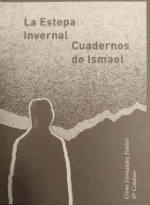 From the very first verses, the poetic word brings us face to face with the existencial emptiness of contemporary man: “Who is he that wanders aimless / across the vastness of the steppe? Is it you, Polaris / my long lost brother?” The question comes from a voice we cannot identify, like the voice of one of the fallen spirits who rebuked Virgil in Hell, alluding to Dante’s presence in that infernal place: “Who is this / who deathless / walks through the reign of the dead?” The focus here, nonetheless, is very different. In La Estepa Invernal, the man in anguish and the doctor who attends him share a desolation in which it seems imposible to meet in an embrace: society has systematized distances. Unlike Dante and his fallen spirits, Ismael and Polaris are not fixed at the antipodes of existence, but in a poetic wasteland where anguish expresses both the possibility of and the desire for death, and days pass deprived of meaning: “The light flickers in the darkness / Far below lies a man / So deep that brotherhood cannot reach him.”
From the very first verses, the poetic word brings us face to face with the existencial emptiness of contemporary man: “Who is he that wanders aimless / across the vastness of the steppe? Is it you, Polaris / my long lost brother?” The question comes from a voice we cannot identify, like the voice of one of the fallen spirits who rebuked Virgil in Hell, alluding to Dante’s presence in that infernal place: “Who is this / who deathless / walks through the reign of the dead?” The focus here, nonetheless, is very different. In La Estepa Invernal, the man in anguish and the doctor who attends him share a desolation in which it seems imposible to meet in an embrace: society has systematized distances. Unlike Dante and his fallen spirits, Ismael and Polaris are not fixed at the antipodes of existence, but in a poetic wasteland where anguish expresses both the possibility of and the desire for death, and days pass deprived of meaning: “The light flickers in the darkness / Far below lies a man / So deep that brotherhood cannot reach him.”
Horacio Castellanos Moya: Envejece un perro tras los cristales. Cuaderno de Tokio seguido de Cuaderno de Iowa [A Dog Ages Behind The Glass. Tokyo and Iowa Notebooks]
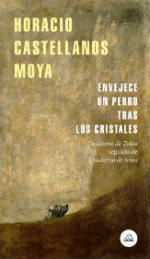 Considered Castellanos Moya’s most personal book, these brief notes and reflections allow us to know the intimacy of a writer ravaged by self-doubt. Here we read two extraordinary notebooks, written in very different circumstances but encouraged by the same will: that of the writer who digs into himself to find clues that will help him understand his way of being in the world. Cuaderno de Tokio [Tokyo Notebook] (Los cuervos de Sangenjaya) [The Crows of Sangenjaya] was the result of a six-month stay in Japan, and Cuaderno de Iowa [Iowa Notebook] Envejece un perro tras los cristales [A Dog Ages Behind The Crystals] was written during his stay as a creative writing teacher in the United States, where he still resides.
Considered Castellanos Moya’s most personal book, these brief notes and reflections allow us to know the intimacy of a writer ravaged by self-doubt. Here we read two extraordinary notebooks, written in very different circumstances but encouraged by the same will: that of the writer who digs into himself to find clues that will help him understand his way of being in the world. Cuaderno de Tokio [Tokyo Notebook] (Los cuervos de Sangenjaya) [The Crows of Sangenjaya] was the result of a six-month stay in Japan, and Cuaderno de Iowa [Iowa Notebook] Envejece un perro tras los cristales [A Dog Ages Behind The Crystals] was written during his stay as a creative writing teacher in the United States, where he still resides.
Juan José Millás: La vida a ratos [Life sometimes]
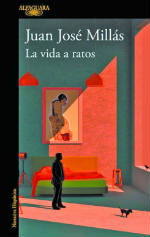 In La vida a ratos the reader is as much a protagonist as the narrator, because he secretly discovers a story that, in fiction, has not been created to be known to anyone but the one who writes it. It is the diary of more than three years about th life of a character – curiously also called Juan José Millás – who is just as free, very neurotic, and funny, and as ironic and as much a hypochondriac as we only show ourselves to be when no one sees us. Visits to the psychoanalyst, the writing workshop, the walks in a city that keeps placing him in surprise situations. Everything is normal, everything seems anodyne until, upon the return of a corner of reality, the extraordinary, the surreal appears.
In La vida a ratos the reader is as much a protagonist as the narrator, because he secretly discovers a story that, in fiction, has not been created to be known to anyone but the one who writes it. It is the diary of more than three years about th life of a character – curiously also called Juan José Millás – who is just as free, very neurotic, and funny, and as ironic and as much a hypochondriac as we only show ourselves to be when no one sees us. Visits to the psychoanalyst, the writing workshop, the walks in a city that keeps placing him in surprise situations. Everything is normal, everything seems anodyne until, upon the return of a corner of reality, the extraordinary, the surreal appears.
Katie Brown: Writing and the Revolution Venezuelan Metafiction 2004-2012
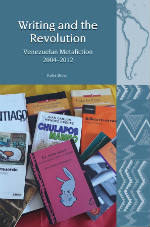 In contrast to recent theories of the ‘global’ Latin American novel, this book reveals the enduring importance of nationalist themes in contemporary Venezuelan fiction, arguing that the novels studied respond to both the nationalist and populist cultural policies of the Bolivarian Revolution and Venezuela’s literary isolation. Each chapter explores a way in which these novels reflect on writing, from the protagonists as readers and writers in different contexts, through appearances from real life writers, and through experimentation with style and popular culture. Ultimately, it questions the boundaries between fiction and reality.
In contrast to recent theories of the ‘global’ Latin American novel, this book reveals the enduring importance of nationalist themes in contemporary Venezuelan fiction, arguing that the novels studied respond to both the nationalist and populist cultural policies of the Bolivarian Revolution and Venezuela’s literary isolation. Each chapter explores a way in which these novels reflect on writing, from the protagonists as readers and writers in different contexts, through appearances from real life writers, and through experimentation with style and popular culture. Ultimately, it questions the boundaries between fiction and reality.
Leila Guerriero: Opus Gelber. Retrato de un pianista [Opus Gelber. Portrait of a pianist]
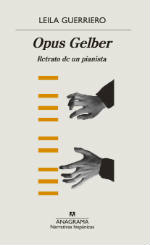 In a careful goldsmith’s work, Guerriero illuminates Gelber’s life through multiple accounts. The result is a book in which both the portrait and the painter establish an eerie game of seduction. As one retreats and wraps himself in an enigmatic halo, the other patiently stops at the most significant gestures and silences. “Guerriero returns to the genre that made her great, and that she has never abandoned, to speak truth, incorporating tools of the fictional story, with attention to the rules of journalistic research. Aroma and distance” (Andrés Rubín de Celis, La Vanguardia).
In a careful goldsmith’s work, Guerriero illuminates Gelber’s life through multiple accounts. The result is a book in which both the portrait and the painter establish an eerie game of seduction. As one retreats and wraps himself in an enigmatic halo, the other patiently stops at the most significant gestures and silences. “Guerriero returns to the genre that made her great, and that she has never abandoned, to speak truth, incorporating tools of the fictional story, with attention to the rules of journalistic research. Aroma and distance” (Andrés Rubín de Celis, La Vanguardia).
María Moreno: A tontas y a locas [At Random]
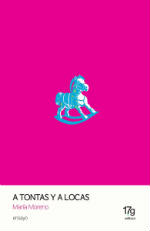 In 2001, this set of articles was compiled with the title A tontas y a locas [At Random]. This book came out again a few years later and now, eighteen years later, now that the texts have aged, the Bahiense publishing house 17 Grises took on the essential task of re-editing it. Journalist, narrator and cultural critic, Moreno has just been awarded the Ibero-American Prize Manuel Rojas for her valuable work. Beyond the margins of literature and the establishment, her work transgresses genders and eliminates borders in a project that reads the wastes of culture without judging, changing their sign, liberating their reading, expanding senses in a critical and libertarian manner.
In 2001, this set of articles was compiled with the title A tontas y a locas [At Random]. This book came out again a few years later and now, eighteen years later, now that the texts have aged, the Bahiense publishing house 17 Grises took on the essential task of re-editing it. Journalist, narrator and cultural critic, Moreno has just been awarded the Ibero-American Prize Manuel Rojas for her valuable work. Beyond the margins of literature and the establishment, her work transgresses genders and eliminates borders in a project that reads the wastes of culture without judging, changing their sign, liberating their reading, expanding senses in a critical and libertarian manner.
Mario Levrero: Cuentos completos [Complete Short Stories]
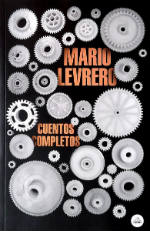 From his teacher, Kafka, Levrero learned to not write well, and other qualities present in these stories: first person split between the law of the world and the illusion of freedom, collapsing humor, the superstition of the word epifánica. But Levrero is great on his own merits: by the transformative capacity of his writing which is always in progress, allergic to trivial artifices. That is why this author of La novela luminosa [The Luminous Novel] occupies a central place in contemporary Spanish literature. Gathered for the first time, these Cuentos completos. [Complete Collection of Short Stories] is a notable publishing event, as Babelia asserts.
From his teacher, Kafka, Levrero learned to not write well, and other qualities present in these stories: first person split between the law of the world and the illusion of freedom, collapsing humor, the superstition of the word epifánica. But Levrero is great on his own merits: by the transformative capacity of his writing which is always in progress, allergic to trivial artifices. That is why this author of La novela luminosa [The Luminous Novel] occupies a central place in contemporary Spanish literature. Gathered for the first time, these Cuentos completos. [Complete Collection of Short Stories] is a notable publishing event, as Babelia asserts.
Mauro Libertella: Laberintos en línea recta (Mapa de las lenguas) [Labyrinths in a straight line (Map of languages)]
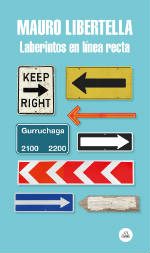 Laberintos en línea recta brings together the three autobiographical stories of Mauro Libertella, forming a unique novel about initiation through bereavement, the realization of mortality, and love. These three foundational experiences, narrated in the first person with both autobiographical and fictional elements, take us to the Buenos Aires of the nineties, to the intimacy of private life that does not go as one expects, to the inner dialogue with which they face the unmentionable and incomprehensible. These three subtle texts are not without humor; they are a distillation of life.
Laberintos en línea recta brings together the three autobiographical stories of Mauro Libertella, forming a unique novel about initiation through bereavement, the realization of mortality, and love. These three foundational experiences, narrated in the first person with both autobiographical and fictional elements, take us to the Buenos Aires of the nineties, to the intimacy of private life that does not go as one expects, to the inner dialogue with which they face the unmentionable and incomprehensible. These three subtle texts are not without humor; they are a distillation of life.
Juan Ramón Ribeyro: La palabra del mudo (ed. conmemorativa) [The Word of the Mute (commemorative ed.)]
 Ribeyro’s complete short stories form part of the Commemorative Edition, celebrating 90 years since his birth. La palabra del mudo [The Word of the Mute], with a prologue by Sara Mesa, is composed of almost a hundred stories and is responsible for giving voice to those characters who are deprived of it daily: the marginalized, the forgotten, those condemned to an underground existence. Ribeyro’s storytelling production conveys the longings, outbursts, and anxieties of its protagonists through clean prose and a distant style far removed from trickery, offering up one of the greatest examples of the short narrative in the Western world.
Ribeyro’s complete short stories form part of the Commemorative Edition, celebrating 90 years since his birth. La palabra del mudo [The Word of the Mute], with a prologue by Sara Mesa, is composed of almost a hundred stories and is responsible for giving voice to those characters who are deprived of it daily: the marginalized, the forgotten, those condemned to an underground existence. Ribeyro’s storytelling production conveys the longings, outbursts, and anxieties of its protagonists through clean prose and a distant style far removed from trickery, offering up one of the greatest examples of the short narrative in the Western world.
Juan Ramón Ribeyro: Prosas apátridas (ed. conmemorativa) [Stateless Prose (commemorative ed.)]
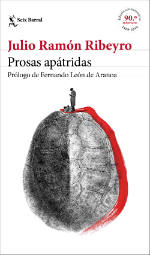 With a foreword by Fernando León de Aranoa, this is the spiritual testimony of one of the great authors of Spanish-American letters is published again in this commemorative edition on the 90th anniversary of the birth of Julio Ramón Ribeyro. Somewhere between aphorism, philosophical essay, and journal, Prosas apátridas is a work of singular strength. Each annotation is a succulent morsel of wisdom on topics as diverse as literature, memory and forgetfulness, old age and childhood, or love and sex. Julio Ramón Ribeyro explores new ways of representing a reality perceived as hopelessly fragmented. His elegant and precise style and his irony and bitter lucidity give unity to these pages that capture the condition of the modern man in all its depth.
With a foreword by Fernando León de Aranoa, this is the spiritual testimony of one of the great authors of Spanish-American letters is published again in this commemorative edition on the 90th anniversary of the birth of Julio Ramón Ribeyro. Somewhere between aphorism, philosophical essay, and journal, Prosas apátridas is a work of singular strength. Each annotation is a succulent morsel of wisdom on topics as diverse as literature, memory and forgetfulness, old age and childhood, or love and sex. Julio Ramón Ribeyro explores new ways of representing a reality perceived as hopelessly fragmented. His elegant and precise style and his irony and bitter lucidity give unity to these pages that capture the condition of the modern man in all its depth.
Juan Ramón Ribeyro: La tentación del fracaso (ed. conmemorativa) [The Temptation of Failure (commemorative ed.)]
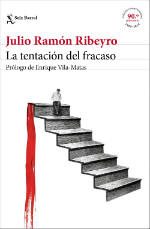 This commemorative edition of the 90th anniversary of the birth of Julio Ramón Ribeyro, with a prologue by Enrique Vila-Matas, constitutes a colossal work not originally intended for publication. It projects itself as one of the most intense and touching of the writer’s livey and creative journey. From the late 1940s, the great Peruvian writer Julio Ramón Ribeyro was shaping a personal diary that accompanied him during multiple trips and stays in Spain, France, Germany, Belgium, and Peru.
This commemorative edition of the 90th anniversary of the birth of Julio Ramón Ribeyro, with a prologue by Enrique Vila-Matas, constitutes a colossal work not originally intended for publication. It projects itself as one of the most intense and touching of the writer’s livey and creative journey. From the late 1940s, the great Peruvian writer Julio Ramón Ribeyro was shaping a personal diary that accompanied him during multiple trips and stays in Spain, France, Germany, Belgium, and Peru.
Roberto Brodsky: Adiós a Bolaño [Farewell to Bolaño]
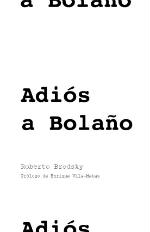 With a foreword by Enrique Vila-Matas, Roberto Brodsky explains that this book constitutes “the bet of a reader advantaged by the circumstances of friendship, immigration status, and profession. The texts that make up this selection cover twenty years of dialogue and reading of Bolaño’s work and its context. In them, the reader will not find finished theses or academic formats to which he might subject the fiction and poetry of the author of 2666. Instead, he will find lines and reading notes. The image, it occurs to me, is that of the commentary that we find on the margin of a page or the underline of a sentence that triggers upon another the illumination of the text that we have in front of us.”
With a foreword by Enrique Vila-Matas, Roberto Brodsky explains that this book constitutes “the bet of a reader advantaged by the circumstances of friendship, immigration status, and profession. The texts that make up this selection cover twenty years of dialogue and reading of Bolaño’s work and its context. In them, the reader will not find finished theses or academic formats to which he might subject the fiction and poetry of the author of 2666. Instead, he will find lines and reading notes. The image, it occurs to me, is that of the commentary that we find on the margin of a page or the underline of a sentence that triggers upon another the illumination of the text that we have in front of us.”
Rodrigo Blanco Calderón: The Night
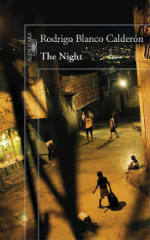 Recently awarded the III Premio Bienal de Novela Mario Vargas Llosa, this novel tells the story of two friends. One is a frustrated writer, and the other is a psychiatrist accustomed to getting involved in the lives of his patients. They discuss a series of crimes that occurred in the previous year. “In The Night, Rodrigo Blanco Calderón turns Venezuela’s very serious situation into an impressive metaphor for our contemporary world; a disoriented, unequal and violent world that seeks, even among the ruins of the twentieth century, the path to a future that doesn’t come.” Gustavo Guerrero, editor of Gallimard.
Recently awarded the III Premio Bienal de Novela Mario Vargas Llosa, this novel tells the story of two friends. One is a frustrated writer, and the other is a psychiatrist accustomed to getting involved in the lives of his patients. They discuss a series of crimes that occurred in the previous year. “In The Night, Rodrigo Blanco Calderón turns Venezuela’s very serious situation into an impressive metaphor for our contemporary world; a disoriented, unequal and violent world that seeks, even among the ruins of the twentieth century, the path to a future that doesn’t come.” Gustavo Guerrero, editor of Gallimard.
Scott Weintraub: La poética filosófica de Juan Luis Martínez [The Philosophical Poetics of Juan Luis Martínez]
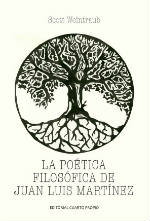 In 1977 Juan Luis Martínez published La nueva novela [The New Novel], the book that would consecrate him as one of the most original spirits of Chilean poetry of this century – and the last. His work continues to expand, and the critical pages that reference it are innumerable and, perhaps, duly complex. The best, I believe, have been written by Scott Weintraub. As far as I know, no one has gone so far in a detective obsession with unraveling that wonderful maze of signs, quotes and elaborate textual traps that make up Martinez’s work. Now, finally, this magnificent critical text arrives: La poética filosófica de Juan Luis Martínez. It is a seminal study within that extensive corpus that forms the academy we call “Martinian studies.” (Marcelo Rioseco)
In 1977 Juan Luis Martínez published La nueva novela [The New Novel], the book that would consecrate him as one of the most original spirits of Chilean poetry of this century – and the last. His work continues to expand, and the critical pages that reference it are innumerable and, perhaps, duly complex. The best, I believe, have been written by Scott Weintraub. As far as I know, no one has gone so far in a detective obsession with unraveling that wonderful maze of signs, quotes and elaborate textual traps that make up Martinez’s work. Now, finally, this magnificent critical text arrives: La poética filosófica de Juan Luis Martínez. It is a seminal study within that extensive corpus that forms the academy we call “Martinian studies.” (Marcelo Rioseco)
Socorro Venegas: La memoria donde ardía [Where memory burning]
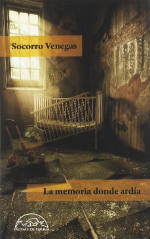 Socorro Venegas provides a moving, precise voice. Her book is a continuous contraction for a hectic reader, amid the misplaced childhood of sick and blind children, isolated children, children who are not children. A swing along a denied motherhood since its gestation, of maternity that is not motherhood at all. A journey within a lost and distant memory of what was once the most desired. A heartbreaking, infinite book that tells us about the music of loneliness, the laughter of bullied childhood or the escape of a mother who escapes, leaving a crib during any night.
Socorro Venegas provides a moving, precise voice. Her book is a continuous contraction for a hectic reader, amid the misplaced childhood of sick and blind children, isolated children, children who are not children. A swing along a denied motherhood since its gestation, of maternity that is not motherhood at all. A journey within a lost and distant memory of what was once the most desired. A heartbreaking, infinite book that tells us about the music of loneliness, the laughter of bullied childhood or the escape of a mother who escapes, leaving a crib during any night.
Enrique Vila-Matas: Esta bruma insensata [An senseless haze]
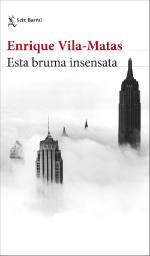 When walking to the edge of the abyss where certainties are reeling, an escape in time can be an open door to writing without additives, of the sort that blows the boundaries of fiction, transcending personal and historical experience, conceiving of a geography dreamed up by a soul liberated from everything, even from his own misfortune. This senseless mist is a novel about the inextinguishable energy that comes from absence and about the tension between faith in writing and radical rejection of it. Enrique Vila-Matas, one of the best storytellers of our day, illuminates this paradox: that the only possible originality arises from the art of quotation in a lucid and brilliant duel of ingenuities between two ways of understanding literary creation.
When walking to the edge of the abyss where certainties are reeling, an escape in time can be an open door to writing without additives, of the sort that blows the boundaries of fiction, transcending personal and historical experience, conceiving of a geography dreamed up by a soul liberated from everything, even from his own misfortune. This senseless mist is a novel about the inextinguishable energy that comes from absence and about the tension between faith in writing and radical rejection of it. Enrique Vila-Matas, one of the best storytellers of our day, illuminates this paradox: that the only possible originality arises from the art of quotation in a lucid and brilliant duel of ingenuities between two ways of understanding literary creation.
Compiled and revised by Claudia Cavallín and Michael Redzich


